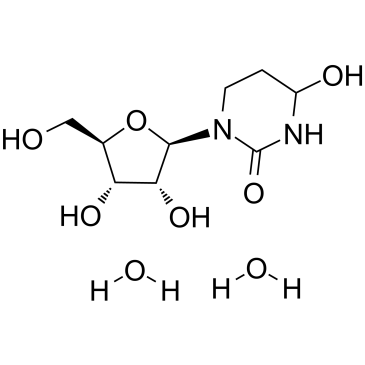Tetrahydrouridine dihydrate |
| Catalog No.GC61326 |
Tetrahydrouridine dihydrate (THU dihydrate) is potent inhibitor of cytidine deaminase (CDA), which competitively blocks the enzyme's active site more effectively than intrinsic cytidine.
Products are for research use only. Not for human use. We do not sell to patients.

Sample solution is provided at 25 µL, 10mM.
Tetrahydrouridine dihydrate (THU dihydrate) is potent inhibitor of cytidine deaminase (CDA), which competitively blocks the enzyme's active site more effectively than intrinsic cytidine.
Tetrahydrouridine (THU) is a specific inhibitor of cytidine deaminase (CDA) which can suppress deamination in the catabolism of cytotoxic deoxycytidine analogues like ara-C and Gemcitabine. To test how Tetrahydrouridine affects the Gemcitabine-mediated anti-neoplastic effect on pancreatic and lung carcinoma cells, a combination therapy is performed. As expected, high CDA expression in BxPC-3 and H441 results in improved Gemcitabine sensitivity after a 100 µM Tetrahydrouridine treatment. The sensitivity of BxPC-3 and H441 cell lines increases by as much as approximately 2.1 and 4.4 fold respectively. On the other hand, MIAPaCa-2 and H1299 cells unexpectedly become more sensitive to Gemcitabine with low CDA expression. MIAPaCa-2 and H1299 cells show a change in IC50 of 2.2 and 2.3 fold respectively. However, Panc-1 and H322 cells do not show significant changes in drug sensitivity. These data suggested that Tetrahydrouridine can sensitize some pancreatic and lung carcinoma cells to Gemcitabine-induced cell death regardless of CDA expression levels. Tetrahydrouridine inhibits S-phase without apoptosis[1].
Administration of 167 mg/kg Tetrahydrouridine (THU) followed by 1.0 mg/kg DAC results in death in one male and eight females. Animals surviving to scheduled termination are generally asymptomatic with no treatment related effects observed in body weights, food consumption, clinical chemistry and urinalysis for a treatment up to 1.0 mg/kg DAC in combination with 167 mg/kg Tetrahydrouridine in animals[2].
[1]. Funamizu N, et al. Tetrahydrouridine inhibits cell proliferation through cell cycle regulation regardless of cytidine deaminase expression levels. PLoS One. 2012;7(5):e37424. [2]. Terse P, et al. Subchronic oral toxicity study of decitabine in combination with tetrahydrouridine in CD-1 mice. Int J Toxicol. 2014 Mar-Apr;33(2):75-85.
Average Rating: 5 (Based on Reviews and 7 reference(s) in Google Scholar.)
GLPBIO products are for RESEARCH USE ONLY. Please make sure your review or question is research based.
Required fields are marked with *




















